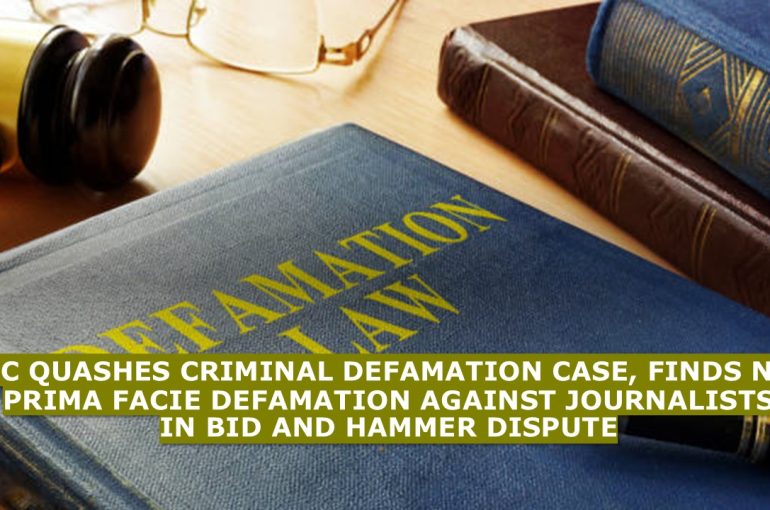SUPREME COURT QUASHES CRIMINAL DEFAMATION CASE, FINDS NO PRIMA FACIE DEFAMATION AGAINST JOURNALISTS IN BID AND HAMMER DISPUTE
The Judgment in the case of Jaideep Bose & Others vs. M/s. Bid and Hammer Auctioneers Pvt. Ltd. (Criminal Appeal Nos. 814-817 of 2025), arising out of SLP (Crl.) Nos. 10212, 13443, 15653 and 16153 of 2024, was delivered by a Division Bench of the Supreme Court of India, comprising Hon’ble Justice J.B. Pardiwala and Justice R. Mahadevan on February 18, 2025. The case revolves around criminal defamation allegations under Sections 499 and 500 IPC against journalists and editors for publishing news articles questioning the authenticity of paintings auctioned by the Respondent. The Supreme Court examined the scope of journalistic freedom, procedural lapses in summoning, and the necessity of specific allegations for defamation charges, ultimately quashing proceedings against Appellants.
Brief Facts of the Case:
These criminal appeals arise from an Order dated 18.06.2024 passed by the Karnataka High Court in Criminal Petition No. 3829 of 2017, dismissing the Appellants’ plea to quash criminal proceedings initiated against them under Sections 499 and 500 of the IPC. The case originates from a private complaint filed on 22.08.2014 by M/s. Bid and Hammer Auctioneers Pvt. Ltd. against the Appellants, alleging defamation through news articles published in various newspapers regarding the authenticity of paintings auctioned by the Respondent. The trial court took cognizance, registered the complaint as PCR No. 13146/2014 (later CC No. 18491/2016), and issued summons on 29.07.2016. The High Court quashed the complaint against M/s. Bennett Coleman & Co. Ltd. (Accused No.1) but upheld the case against other Accused persons, prompting them to approach the Supreme Court.
Issues
- Whether the criminal proceedings under Sections 499 and 500 IPC should be quashed against the Appellants.
- Whether the news articles published by the Appellants amounted to defamation.
- Whether the Appellants had a direct role in publishing the alleged defamatory content.
- Whether the Magistrate complied with the mandatory inquiry under Section 202 Cr.P.C. before summoning Accused persons residing outside the jurisdiction.
- Whether journalistic freedom and public interest reporting constitute a valid defense against defamation claims.
Contentions by the Parties:
Appellants’ Contentions:
Accused No.2 (SLP (Crl.) No.10212 of 2024): The Appellant, being an editorial director, was neither the author nor the editor of the alleged articles. There was no specific averment in the complaint detailing his role. The Magistrate failed to conduct a mandatory inquiry under Section 202 Cr.P.C., and no independent witnesses confirmed reputational harm.
Accused No.12 (SLP (Crl.) No.13443/2024): The complaint does not mention any article written by the Appellant. The Appellant’s article, published a month after the auction, only discussed authentication challenges in Indian art. The summoning order lacked proper inquiry under Section 202 Cr.P.C., making it legally unsustainable.
Accused Nos.8, 9, 10, and 13 (SLP (Crl.) No.15653 of 2024): The complaint incorrectly attributed authorship, and the High Court relied on the Respondent’s interpretation without reviewing the actual articles. The summons was issued without an inquiry, violating the law laid down in Pepsi Foods Ltd. v. Special Judicial Magistrate ((1998) 5 SCC 749)
Accused No.4 (SLP (Crl.) No.16153/2024): The Appellant authored two articles but was not responsible for editorial changes. The articles only reported concerns raised by experts without making conclusions, thereby not constituting defamation.
Respondent’s Contentions:
The Respondent contended that the articles published by the Accused created suspicion among readers, thereby harming the Respondent’s reputation.
The Respondent also asserted that the editorial director (A2), being responsible for overseeing the publication of news articles, should be held accountable.
The Respondent argued that the Accused acted in connivance to tarnish the Respondent’s credibility and hinder the success of the auction.
The Respondent held that the articles fostered an unjustified public opinion that the auctioned works might be fake, thereby affecting the Respondent’s business.
Supreme court
The Apex Court observed that the Magistrate failed to comply with the procedure mandated under Section 202 Cr.P.C. before taking cognizance of the complaint.The complaint was filed against multiple Accused for different articles published in different editions across various states, which warranted an inquiry before issuing summons.The allegations made in the complaint, when viewed holistically, did not constitute a prima facie case of defamation under Sections 499 and 500 IPC. The articles in question were based on existing public discourse, previously published materials, and reports from experts, and did not indicate any deliberate intent to defame the complainant. Given the failure of procedural compliance and lack of prima facie defamation, the criminal proceedings against the appellants were quashed.
Baddam parichaya Reddy
The Indian Lawyer & Allied Services
Associate
Please log on to our YouTube channel, The Indian Lawyer Legal Tips, to learn about various aspects of the law. Our latest video, titled; “Special Law Vs. General Law” can be viewed at the link below:





































Leave a Reply